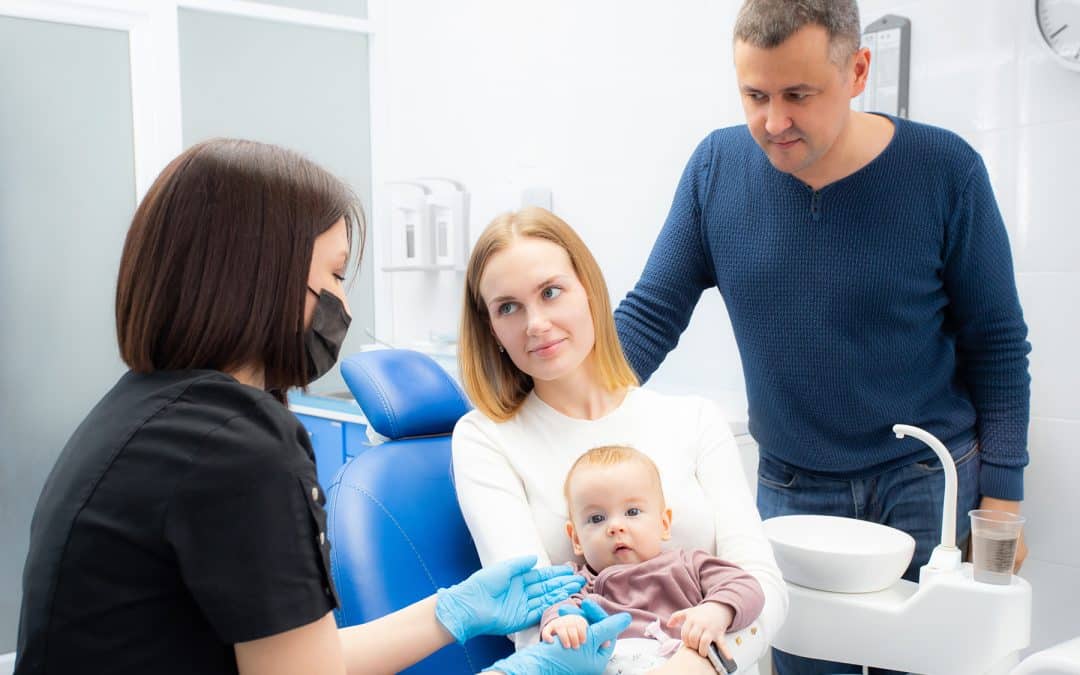Starting dental care at a young age is crucial for ensuring long-term oral health. Early visits to the dentist help detect potential dental issues before they become significant problems, allowing for preventative care measures to be implemented. Pediatric dentists specialize in providing a positive and educational experience for young patients, fostering a lifelong commitment to oral health.
Why are Baby Dental Appointments Important?
- Early Detection of Dental Issues: Regular check-ups allow pediatric dentists to detect issues such as tooth decay, gum disease, and bite abnormalities in their initial stages. By catching these problems early, treatments can be less invasive and more effective, ultimately leading to better oral health outcomes for your child.
- Establishing a Dental Home: A dental home is an ongoing relationship between the dentist and the patient, where comprehensive and continuously accessible dental care is provided. Early visits help your child become familiar with the dentist’s office, reducing anxiety and building trust. This familiarity encourages consistent dental visits, which are vital for maintaining good oral health throughout their life.
- Education for Parents and Children: Pediatric dentists provide valuable information on proper brushing and flossing techniques, the importance of a balanced diet, and how to prevent dental injuries. By educating parents and children early on, pediatric dentists help instill good oral hygiene habits that can last a lifetime.
Age Recommendations for Dental Appointments
First Visit by Age One
Pediatric dental experts recommend that a child’s first dental visit should occur by their first birthday or within six months after the first tooth emerges. During this initial visit, the dentist can assess the child’s oral development, identify any potential issues, and provide parents with guidance on proper oral hygiene practices for their baby.
Milestones and Follow-Up Appointments
Following the first visit, regular dental check-ups are important for monitoring a child’s oral health as they grow. Typically, children should visit the dentist every six months. These routine appointments allow the dentist to track the development of the teeth and jaw, provide preventive treatments like cleanings and fluoride applications, and address any emerging dental concerns. Key milestones, such as the eruption of primary and permanent teeth, offer opportunities for the dentist to ensure that everything is progressing normally and to intervene early if any issues arise.
Common Dental Problems That Young Children Face
- Tooth Decay (Cavities): Tooth decay, or cavities, is one of the most common dental issues in young children. It occurs when sugary foods and drinks combine with plaque to produce acids that erode the enamel. Without proper brushing and flossing, cavities can develop and lead to pain and infection.
- Teething Troubles: As children’s teeth begin to emerge, they may experience discomfort, irritability, and swollen gums. Teething can also cause a mild fever and a tendency to chew on objects to alleviate the pain.
- Early Childhood Caries (ECC): Also known as baby bottle tooth decay, ECC can develop from prolonged exposure to sugary liquids, especially when children go to bed with a bottle.
- Thumb Sucking and Pacifier Use: Prolonged thumb sucking and pacifier use beyond the age of 3-4 can affect the alignment of teeth and the development of the mouth. It can lead to issues such as an open bite or crossbite.
- Gum Disease: Gum disease, though more common in adults, can also affect children. Poor oral hygiene can lead to gingivitis, causing red, swollen, and bleeding gums.
- Dental Trauma: Young children are prone to dental injuries due to falls or accidents while playing. These can range from chipped teeth to knocked-out teeth, requiring prompt dental attention.
- Malocclusion: Malocclusion refers to misaligned teeth or jaws, which can cause difficulty in chewing and speaking. Early orthodontic assessment can help in planning necessary interventions.
- Tooth Grinding (Bruxism): Some children grind their teeth during sleep, which can wear down the enamel and cause jaw pain. It often resolves on its own, but severe cases may need dental evaluation.
Schedule an Early Dental Appointment in Brooklyn, NY
Establishing a strong foundation for your child’s oral health starts with their first dental visit. Contact us today to schedule your child’s first dentist appointment at Pediatric Dentist on Kimball in Brooklyn, NY. Dr. Lionel Vera and his team are dedicated to providing a positive and educational experience for your child.

Dr. Lionel Vera
Dr. Lionel Vera brings warmth, expertise, and advocacy to Pediatric Dentistry on Kimball as a board-certified pediatric dentist. He earned his dental degree from the University of Puerto Rico, Medical Science Campus, followed by a residency at Kingsbrook Jewish Medical Center, where he honed his skills with children and special needs patients. A Brooklyn-based pediatric dentist since 2018, Dr. Vera blends compassionate care with a strong focus on educating both children and parents about oral health. Dr. Vera’s mission: to inspire a lifetime of healthy smiles through trust, education, and proactive care.

